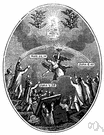virtue
(redirected from Virtue theory)Also found in: Thesaurus, Medical, Encyclopedia.
Related to Virtue theory: deontological theory
vir·tue
(vûr′cho͞o)n.
Idiom: 1.
a. Moral excellence and righteousness; goodness.
b. An example or kind of moral excellence: the virtue of patience.
2. Archaic Chastity, especially in a woman.
3. A particularly efficacious, good, or beneficial quality; advantage: a plan with the virtue of being practical.
4. Effective force or power: believed in the virtue of prayer.
5. virtues Christianity The fifth of the nine orders of angels in medieval angelology.
6. Obsolete Manly courage; valor.
by/in virtue of
On the grounds or basis of; by reason of: well-off by virtue of a large inheritance.
[Middle English vertu, from Old French, from Latin virtūs, manliness, excellence, goodness, from vir, man; see wī-ro- in Indo-European roots.]
American Heritage® Dictionary of the English Language, Fifth Edition. Copyright © 2016 by Houghton Mifflin Harcourt Publishing Company. Published by Houghton Mifflin Harcourt Publishing Company. All rights reserved.
virtue
(ˈvɜːtjuː; -tʃuː)n
1. the quality or practice of moral excellence or righteousness
2. a particular moral excellence: the virtue of tolerance.
3. (Theology) any of the cardinal virtues (prudence, justice, fortitude, and temperance) or theological virtues (faith, hope, and charity)
4. any admirable quality, feature, or trait
5. chastity, esp in women
6. archaic an effective, active, or inherent power or force
7. by virtue of in virtue of on account of or by reason of
8. make a virtue of necessity to acquiesce in doing something unpleasant with a show of grace because one must do it in any case
[C13: vertu, from Old French, from Latin virtūs manliness, courage, from vir man]
ˈvirtueless adj
Collins English Dictionary – Complete and Unabridged, 12th Edition 2014 © HarperCollins Publishers 1991, 1994, 1998, 2000, 2003, 2006, 2007, 2009, 2011, 2014
vir•tue
(ˈvɜr tʃu)n.
1. conformity of one's life and conduct to moral and ethical principles; moral excellence; rectitude.
2. a particular moral excellence.
3. chastity; virginity: to lose one's virtue.
4. a good or admirable quality or property.
5. effective force; power or potency.
6. virtues, an order of angels. Compare angel (def. 1).
7. manly excellence; valor.
Idioms: 1. by or in virtue of, by reason of; because of.
2. make a virtue of necessity, to make the best of a difficult or unsatisfactory situation.
[1175–1225; vertu < Old French < Latin virtūtem, acc. of virtūs desirable male qualities, worth, virtue =vir man (seen virile) + -tūs abstract n. suffix]
syn: See goodness.
Random House Kernerman Webster's College Dictionary, © 2010 K Dictionaries Ltd. Copyright 2005, 1997, 1991 by Random House, Inc. All rights reserved.
Virtue
See Also: ACCOMPLISHMENT, MORALITY, PURITY
- Admirable as the rabbit that lets a tortoise win the race —Mike Sommer
- Chaste as ice —William Shakespeare
- Chastity consists, like an onion, of a series of coats —Nathaniel Hawthorne
- Good as a mother —Vicki Baum
- Hanging on to his virtue like a thief to his loot —Paige Mitchell
- Like gentle streams beneath our feet innocence and virtue meet —William Blake
See Also: INNOCENCE
- Many individuals have, like uncut diamonds, shining qualities beneath a rough exterior —Juvenal
- Piety is like garlic. A little goes a long way —Rita Mae Brown
- Rare virtues are like rare plants or animals, things that have not been able to hold their own in the world —Samuel Butler
Butler’s comparison continues as follows: “A virtue to be serviceable must, like gold, be alloyed with some commoner but more durable metal.”
- Rich in virtue, like an infant —Lao Tzu
- True merit, like a river, the deeper it is, the less noise it makes —Lord Halifax
- Virginal as Eve before she knew Adam —Anon
- Virgins are bores … like people with overpriced houses —Thomas McGuane
- Virtue and learning, like gold, have their intrinsic value; but if they are not polished, they certainly lose a great deal of their luster; and even polished brass will pass upon more people than rough gold —Lord Chesterfield
See Also: EDUCATION
- Virtue is a kind of health, beauty and good habit of the soul —Plato
- A virtue is like a city set upon a hill, it cannot be hid —Robert Hichens
- Virtue is like an enemy avoided —Dante Alighieri
- Virtue is like a polar star, which keeps its place, and all stars turn towards it —Confucius
- Virtue is like a rich stone, best plain set —Francis Bacon
- Virtue is like health: the harmony of the whole man —Thomas Carlyle
- Virtue is like precious odors —most fragrant when they are incensed or crushed —Francis Bacon
- Virtue lies like the gold in quartz; there is not very much of it and much pain has to be spent on the extracting of it —Jerome K. Jerome
- Virtue, like a strong and hardy plant, takes root in any place, if she finds there a generous nature and a spirit that shuns no labor —Plutarch
- Virtues, like essences, lose their fragrance when exposed —William Shenstone
- Virtuous as convict in the death house —H. L. Mencken
Similes Dictionary, 1st Edition. © 1988 The Gale Group, Inc. All rights reserved.
ThesaurusAntonymsRelated WordsSynonymsLegend:
Switch to new thesaurus
| Noun | 1. |  virtue - the quality of doing what is right and avoiding what is wrong virtue - the quality of doing what is right and avoiding what is wrong |
| 2. |  virtue - any admirable quality or attribute; "work of great merit" virtue - any admirable quality or attribute; "work of great merit"worth - the quality that renders something desirable or valuable or useful | |
| 3. |  virtue - morality with respect to sexual relations virtue - morality with respect to sexual relationsmorality - concern with the distinction between good and evil or right and wrong; right or good conduct | |
| 4. |  virtue - a particular moral excellence virtue - a particular moral excellence cardinal virtue - one of the seven preeminent virtues |
Based on WordNet 3.0, Farlex clipart collection. © 2003-2012 Princeton University, Farlex Inc.
virtue
noun
1. goodness, honour, integrity, worth, dignity, excellence, morality, honesty, decency, respectability, nobility, righteousness, propriety, probity, rectitude, worthiness, high-mindedness, incorruptibility, uprightness, virtuousness, ethicalness His mother was held up to the family as a paragon of virtue.
goodness vice, evil, corruption, sin, dishonesty, depravity, immorality, dishonour, debauchery, sinfulness, turpitude
goodness vice, evil, corruption, sin, dishonesty, depravity, immorality, dishonour, debauchery, sinfulness, turpitude
2. merit, strength, asset, plus (informal), attribute, good quality, good point, strong point His chief virtue is patience.
merit failing, drawback, shortcoming, frailty, weak point
merit failing, drawback, shortcoming, frailty, weak point
4. chastity, honour, virginity, innocence, purity, maidenhood, chasteness His many attempts on her virtue were all unavailing.
chastity promiscuity, unchastity
chastity promiscuity, unchastity
by virtue of because of, in view of, on account of, based on, thanks to, as a result of, owing to, by reason of, by dint of Mr Olaechea has British residency by virtue of his marriage.
Quotations
"Virtue is the fount whence honour springs" [Christopher Marlowe Tamburlaine the Great]
"Virtue is its own reward" [Cicero De Finibus]
"Virtue is like a rich stone, best plain set" [Francis Bacon Essays]
"For 'tis some virtue, virtue to commend" [William Congreve]
"Virtue could see to do what Virtue would"
"By her own radiant light, though sun and moon"
"Were in the flat sea sunk" [John Milton Comus]
"Against the threats"
"Of malice or of sorcery, or that power"
"Which erring men call chance, this I hold firm,"
"Virtue may be assailed, but never hurt,"
"Surprised by unjust force, but not enthralled" [John Milton Comus]
"It is queer how it is always one's virtues and not one's vices that precipitate one into disaster" [Rebecca West There Is No Conversation]
"The weakest of all weak things is a virtue which has not been tested in the fire" [Mark Twain The Man That Corrupted Hadleyburg]
"Virtue is the fount whence honour springs" [Christopher Marlowe Tamburlaine the Great]
"Virtue is its own reward" [Cicero De Finibus]
"Virtue is like a rich stone, best plain set" [Francis Bacon Essays]
"For 'tis some virtue, virtue to commend" [William Congreve]
"Virtue could see to do what Virtue would"
"By her own radiant light, though sun and moon"
"Were in the flat sea sunk" [John Milton Comus]
"Against the threats"
"Of malice or of sorcery, or that power"
"Which erring men call chance, this I hold firm,"
"Virtue may be assailed, but never hurt,"
"Surprised by unjust force, but not enthralled" [John Milton Comus]
"It is queer how it is always one's virtues and not one's vices that precipitate one into disaster" [Rebecca West There Is No Conversation]
"The weakest of all weak things is a virtue which has not been tested in the fire" [Mark Twain The Man That Corrupted Hadleyburg]
Collins Thesaurus of the English Language – Complete and Unabridged 2nd Edition. 2002 © HarperCollins Publishers 1995, 2002
virtue
noun1. The quality or state of being morally sound:
2. The condition of being chaste:
3. A special feature or quality that confers superiority:
The American Heritage® Roget's Thesaurus. Copyright © 2013, 2014 by Houghton Mifflin Harcourt Publishing Company. Published by Houghton Mifflin Harcourt Publishing Company. All rights reserved.
Translations
عِفَّه، طَهارَهفَضيلَهميزَه حَسَنَه
ctnostpoctivostvýhoda
dydfordelgod egenskab
avuetuhallitushyve
erényerkölcsi tisztaság
dyggîkosturverîleiki, kostur
dorybėdorybingas
laba rakstura īpašībalabs raksturslabumspriekšrocībatikums
cnosť
vrlina
vrlina
dygd
virtue
[ˈvɜːtjuː] N1. (= good quality) → virtud f
to extol sb's virtues → alabar or ensalzar las virtudes de algn
to make a virtue of necessity → hacer de la necesidad virtud
to extol sb's virtues → alabar or ensalzar las virtudes de algn
to make a virtue of necessity → hacer de la necesidad virtud
2. (= advantage) → virtud f, ventaja f
it has the virtue of simplicity or of being simple → tiene la virtud or ventaja de ser sencillo
I see no virtue in (doing) that → no veo ninguna ventaja en (hacer) eso
it has the virtue of simplicity or of being simple → tiene la virtud or ventaja de ser sencillo
I see no virtue in (doing) that → no veo ninguna ventaja en (hacer) eso
Collins Spanish Dictionary - Complete and Unabridged 8th Edition 2005 © William Collins Sons & Co. Ltd. 1971, 1988 © HarperCollins Publishers 1992, 1993, 1996, 1997, 2000, 2003, 2005
virtue
[ˈvɜːrtʃuː ˈvɜːrtjuː] n (= goodness) → vertu f
(= good quality) → vertu f
Humility is considered a virtue → L'humilité est considérée comme une vertu.
Humility is considered a virtue → L'humilité est considérée comme une vertu.
(= advantage) → vertu f
by virtue of sth → en vertu de qch
Collins English/French Electronic Resource. © HarperCollins Publishers 2005
virtue
n
(= moral quality) → Tugend f; to make a virtue of necessity → aus der Not eine Tugend machen; a life of virtue → ein tugendhaftes Leben
(= chastity) → Keuschheit f, → Tugendhaftigkeit f; a woman of easy virtue (euph) → ein leichtes Mädchen
(= advantage, point) → Vorteil m; what’s the virtue of that? → welchen Vorteil hat das?, wozu ist das gut?; there is no virtue in doing that → es scheint nicht sehr zweckmäßig, das zu tun
Collins German Dictionary – Complete and Unabridged 7th Edition 2005. © William Collins Sons & Co. Ltd. 1980 © HarperCollins Publishers 1991, 1997, 1999, 2004, 2005, 2007
virtue
[ˈvɜːtjuː] n (goodness) → virtù f inv; (advantage) → pregio, vantaggioit has the virtue of simplicity or of being simple → ha il pregio di essere semplice
I see no virtue in doing that → non vedo nessun vantaggio nel farlo
to make a virtue of necessity → fare di necessità virtù
by virtue of → in virtù di, grazie a
Collins Italian Dictionary 1st Edition © HarperCollins Publishers 1995
virtue
(ˈvəːtʃuː) noun1. a good moral quality. Honesty is a virtue.
2. a good quality. The house is small, but it has the virtue of being easy to clean.
3. goodness of character etc. She is a person of great virtue.
ˈvirtuous adjective morally good. She is a virtuous young woman.
ˈvirtuously adverbˈvirtuousness noun
Kernerman English Multilingual Dictionary © 2006-2013 K Dictionaries Ltd.